A Colombian teacher and student struggle to connect to a home country drowning in chaos
Photo courtesy of Luisa Jimenez
Protests against police brutality, poverty, and taxes have rocked Colombia since April 28.
As Colombia’s rates of poverty, police brutality, rape, and also taxes escalate to the highest they have ever been, under President Ivan Duque, the governments response has been crack down on dissension from the population. Since April 28th there have been daily protests in Colombia against a tax reform bill passed called The Sustainable Solidarity Act which raised taxes on basic necessities and public services such as water, natural gas and electricity. CVHS’ Colombian students and faculty members are grappling with the chaos in their family’s home country.
“The reason why people are in the streets right now in Colombia is completely justified, they don’t have anything else to lose, they don’t have access to basic necessities, they don’t have access to work, the population of Colombia right now are only eating one meal a day. The poverty line has increased to 22.7% of the population in Colombia. So the people that are in the streets, especially the young ones, they don’t have anything to lose,” said Jimenez.
In the past two weeks more than 5 million Colombians have taken to the street to protest against a bill that will affect only the working middle class, lower class, and the poor. Additionally the working population is struggling to safely acquire income during this global pandemic, causing a heavier burden to allocate money for basic necessities that are now also being taxed. While their citizens exercise the right to protest in the streets they are being met with violence and brutality from the police force that has already killed 52 people.
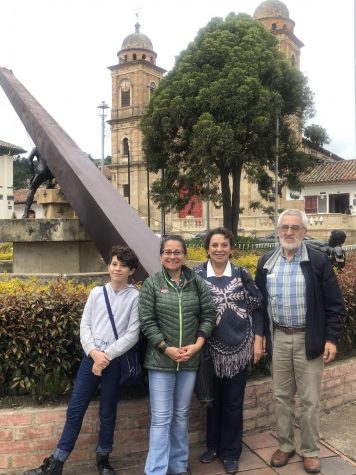
At CVHS Junior Nicolas Lopez and Spanish teacher Ms. Jimenez are enduring an emotional hardship as they can’t physically be in Colombian to help their family and friends. Lopez moved here when he was very young with just his parents, leaving the rest of his family behind. Secondly Jimenez arrived in the United States on May, 14 1994 25 years ago with her husband. Similarly Lopez and Jimenez both came here because they had to. Not because they wanted to.
“The language and the culture you know that’s what my family has been raising me upon. I think it’s more than just what color your skin or where you’re from, its the respect that you have for the people [in Colombia] and the love that you have for the place. That’s what connects me,” said Lopez.
From April 28 to May 25 Jimenez has internalized and memorized all of the horrifying statistics from the violence during the protests.
“2387 cases of police brutality, 52 killed, 18 cases of rape and sexual violence, 33 victims that have lost their eyesight, and 379 people that have disappeared because the police took them. [The police] don’t take them through any processes or to our districts and no one knows where these people are. If you are marching you do something that is against the law. You have the right to due process. They can arrest you and your own just kill you for no particular reason,” said Jimenez.
Jimenez explains that Colombia is fighting a war against themselves, they are internally battling against their own people, government, and country.
“You know what is the saddest part. I’m not going to call police officers bad because in Columbia police officers are also very young boys from poor neighborhoods. They don’t have anything else to do but join the police, and they’re really just confronting people against people, poor people against poor people, for the benefit of the government, who are manipulating everything, so they can kill each other,” said Jimenez.
On Thursday May 20, the National Strike Committee called for civilians to protest on the streets, however right after the National Strike Committee made this call Colombia responded with violence. Molano, the minister of National Defense of Colombia, and Ivan Duque, the president, declared police to massacre the civilians that showed up to protest. This one call killed 10 people and the senator declared this as an act of terrorism against its own country.
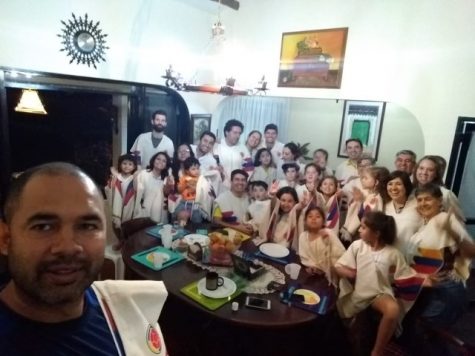
“I’m telling you people, that people in Colombia are so fed up, they don’t have anything else to lose, that they’re all willing to protest and we don’t care. Ivan Duque just directed all the armed forces and the police officers to use all the force that is needed in order to put everything back together, or some bull****like that. So Molano just went through with the order. That is terrorism. It was declared against civilians, and went against all the rights of speech and protest in our constitution. This is a violation of the international human rights document,” said Jimenez.
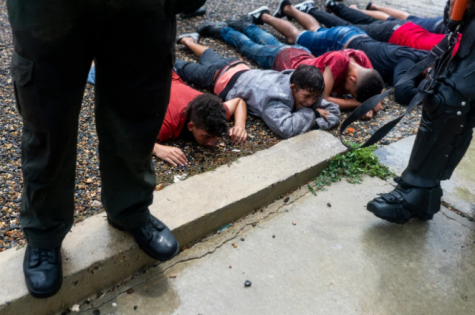
“At the end of the day it doesn’t matter what we call it, malicious, stupid, illegal, or terrorism just fix the issue, but unfortunately, in this case, the government is just harming themselves.” said Lopez
Nicolas Lopez grew up in Colombia and moved here when he was very young, leaving him with vague memories of his home town that will always have a place in his heart.
“I remember when I grew up, I lived only a few years in Colombia when I was very little. We would play baseball and we would run around the neighborhood. Here in Houston, I never really went out and made friends with people in my neighborhood so I guess it was different over there like the way we socialized,” said Lopez
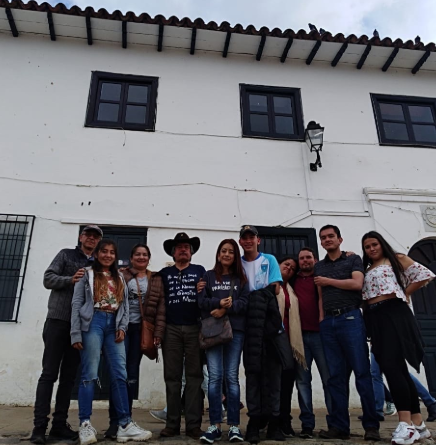
Furthermore there is the additional burden that Colombia is still struggling to fight through Covid-19. The average number of new coronavirus infections are rising to a new high, counting over 18,000 cases daily. Additionally only 8.4% of the entire country have been administered vaccinations. However Colombians are still pushing themselves to go out and protest and risk their lives to support their families
“The management of the coronavirus in Columbia has been awful, awful. Colombia is number four in the world with the highest infection rates. You see many people in the streets with posters that say ‘we are so fed up that we aren’t afraid to die of COVID anymore.’ Of course, all rich people or if you have friends in the government, even senators from the Congress, organized a trip in a private plane to Miami to get vaccinated, with taxpayer money. While [the senators] are working from their homes and getting a salary that is 48 times larger than the minimum salary of a normal Colombian person,” said Jimenez.
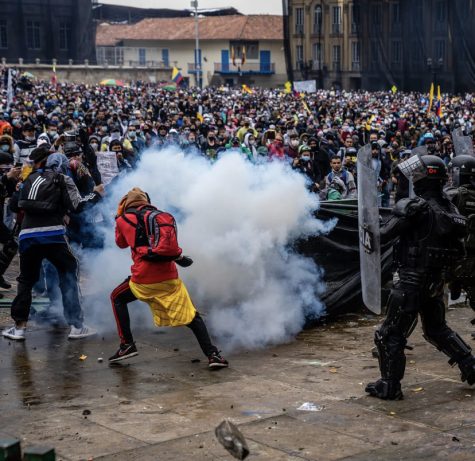
Colombia has administered a strict quarantine for all of their population, including business restrictions and an early curfew that demands civilians to be home by 5 pm.
“The quarantine in Colombia has been awful. In Colombia there are people that wherever they work during the day, is the money that they have to eat that day, people who sell things in the streets, people that clean houses, people that do gardens, and the quarantine was so restrictive that didn’t allow these people to go outside of work, and the government is not giving them a check like they do here. There’s nothing. They’re dying of hunger, and if they go outside, they find the police that require you to stay inside. They put them in jail because they just try to go and work,” said Jimenez.
Jimenez recently has been on Instagram and found a group of artists who go live every night. During these lives people who are physically protesting in Colombia can ask to join the live. Since the artist already has a large platform when the protesters join the live they are broadcasting live events to thousands of people. Unfortunately one night, Jimenez witnessed a terrible example of police brutality.
“One case that was really stressful is in Bogota. Students were inside of their university, college campus. Well it was at night, and the majority of that city has a curfew. And suddenly, the police came and didn’t allow them to leave the campus. They started throwing bombing gases, and some other bombs that when they throw them, they make you feel dizzy and lost. So someone called this live transmission and joined…I’m telling you, and we went on Twitter, and started tweeting to the governor and the major of human rights, like crazy but crazy. Until one or two hours after they allowed human corridors for the students to leave campus. Thank goodness,” said Jimenez.
For both Lopez and Jimenez the tax reform hits close to home because they both have families that are in the middle class and are being affected by the tax reform.
“My family’s been affected by I have a lot of family members that lost their jobs because of the COVID pandemic and then on top of that, the taxes which is like just putting them in a much more difficult position,” said Lopez
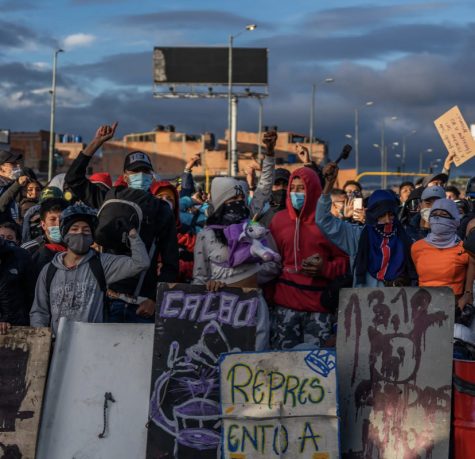
“I’m sorry to cry. I’m so touchy now. All my family are middle class, just pure middle class, we were in a family that depended solely and only on my father’s income. My mother was a housewife. On top of everything my father’s retirement money and death is going to be taxed. My father is 81, and my mother is 76, and they don’t have any private insurance. They depend on public health services, as they privatize health and medicine, everything is going to be at high costs for my parents,” said Jimenez.
Unfortunately for most people since they can’t physically be in Colombia to help and protest in the streets, it makes them feel more distant; however, Jimenez does not let distance get in the way of her support.
“So, my husband one day told me, Louisa, you have one foot in Colombia, or one here. And he’s right. I was talking to my brother and he said Louisa ‘some things are getting bad, bad, bad, bad, bad. We have been improving so much the last few years, and the Columbia that you left 27 years ago, is the one that we have right now today. So we went back again 30 years. And that made me so, so sad, but I don’t feel more distance. Because every night, there is a group of people that I have been sending money, they are called “La Oya de la Communidad”(The pot of the Community). Mothers in the neighborhoods get together, start cooking and give out food. They make sure that people are hydrated, and eating well,” said Jimenez.
Your donation will support the student journalists of Carnegie Vanguard High School. Your contribution will allow us to cover our annual website hosting costs and fund field trips, competition fees, and equipment. We appreciate your support!

Hi, I'm a senior. I am a feature story editor and i have the best dog in the world.



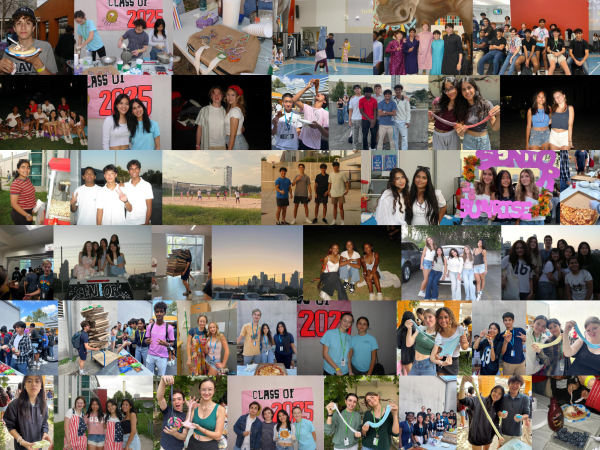
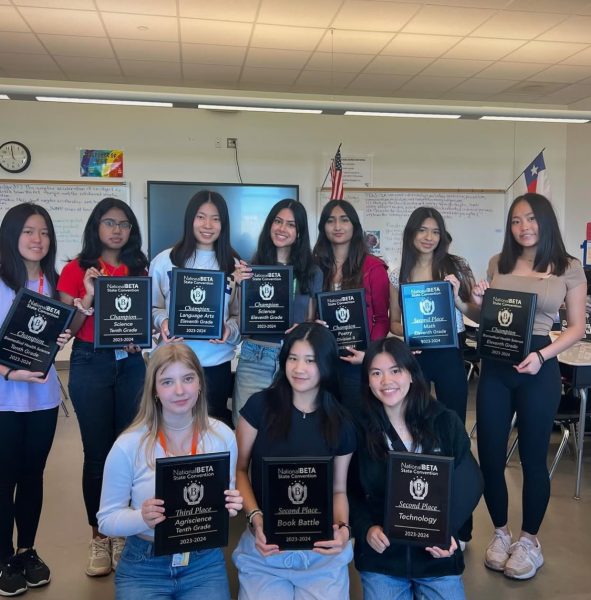


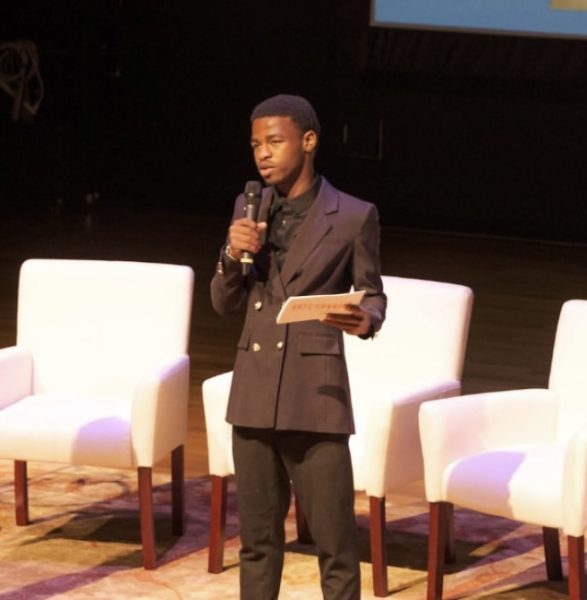
Andres Pargas • Jun 1, 2021 at 5:17 pm
Good job on the story. It was very interesting
Nicole Rodil Suarez • Jun 1, 2021 at 10:34 am
The pictures went really well with the article and the quotes were really good and informative.
Ash Brown • Jun 1, 2021 at 10:30 am
Great job on your story! You really laid out the issues and connected it to your sources.
Diego A Gonzalez • Jun 1, 2021 at 10:26 am
Excellent writing and this is as a great way to bring attention to all the things happening in Colombia right now.
Jonathon Morales • Jun 1, 2021 at 10:21 am
Great story, very informative, but also sad to hear what’s going on in Columbia
Marcos Delgadillo • Jun 1, 2021 at 10:19 am
Great article, thank you for talking about this topic. It is important for everyone to be aware and how to help.
Thomas Dowe • Jun 1, 2021 at 10:15 am
This is an expertly written long piece I enjoyed that you interwove the story in Colombia with people at Carnegie.
Abigail Nunez • Jun 1, 2021 at 10:14 am
It’s really sad to see how the government can reach such measures withouth caring for the health of its citizens. They manipulate the situation to however they will benefit from it financially , and on power.
Amy Maya • Jun 1, 2021 at 10:14 am
I really liked the pictures you used for the article.
Judith Carrizales • Jun 1, 2021 at 10:13 am
Good job on the story. I liked the quotes you used.
My-Tran Vo • Jun 1, 2021 at 10:11 am
I liked all the quotes you had and how detailed this article was
Lexy Silva • Jun 1, 2021 at 10:10 am
I like the way you structured the quotes